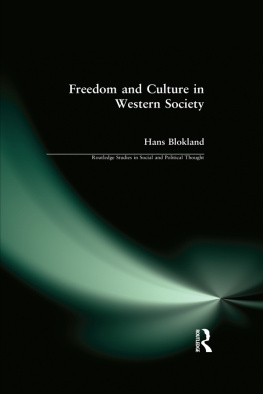Modernization and Its Political Consequences
Modernization and Its Political Consequences
Weber, Mannheim, and Schumpeter
Hans Blokland
Translated by Nancy Smyth Van Weesep

The translation of this book was made possible by a publication grant from the Netherlands Organization for Scientific Research (NWO).
Published with assistance from the foundation established in memory of Philip Hamilton McMillan of the class of 1894, Yale College.
First published in Dutch in 2001 as De Modernisering en haar Politieke Gevolgen: Weber, Mannheim en Schumpeter (Amsterdam: Boom) Hans Blokland.
Copyright 2006 by Yale University. All rights reserved. This book may not be reproduced, in whole or in part, including illustrations, in any form (beyond that copying permitted by Sections 107 and 108 of the U.S. Copyright Law and except by reviewers for the public press), without written permission from the publishers.
Set in Adobe Garamond type by The Composing Room of Michigan, Inc. Printed in the United States of America.
Library of Congress Cataloging-in-Publication Data
Blokland, Hans Theodorus.
[Modernisering en haar politieke gevolgen. Dutch]
Modernization and its political consequences : Weber, Mannheim, and Schumpeter / Hans Blokland.
p. cm.
Translated by Nancy Smyth Van Weesep.
Includes bibliographical references and index.
ISBN-13: 978-0-300-11081-4 (cloth : alk. paper)
ISBN-10: 0-300-11081-2 1. Political sciencePhilosophy. 2. Politics and culture. I. Title.
JA71.B54513 2006
320.01dc22
2006008117
A catalogue record for this book is available from the British Library.
The paper in this book meets the guidelines for permanence and durability of the Committee on Production Guidelines for Book Longevity of the Council on Library Resources.
10 9 8 7 6 5 4 3 2 1
For Ed and Rose Lindblom
Dem einzelnen Menschen mgen mancherlei persnliche Ziele, Zwecke, Hoffnungen, Aussichten vor Augen schweben, aus denen er den Impuls zu hoher Anstrengung und Ttigkeit schpft; wenn das Unpersnliche um ihn her, die Zeit selbst der Hoffnungen und Aussichten bei aller usseren Regsamkeit im Grunde entbehrt, wenn sie sich ihm als hoffnungslos, aussichtslos und ratlos heimlich zu erkennen gibt und der bewusst oder unbewusst gestellten, aber doch irgendwie gestellten Frage nach einem letzten, mehr als persnlichen, unbedingten Sinn aller Anstrengung und Ttigkeit ein hohles Schweigen entgegensetzt, so wird gerade in Fllen redlicheren Menschentums eine gewisse lhmende Wirkung solches Sachverhalts fast unausbleiblich sein...
Thomas Mann (1924: 50)
The scientific outlook in political science can easily produce a dangerous and dysfunctional humility: the humility of the social scientist who may be quite confident of his findings on small matters and dubious that he can have anything at all to say on larger questions. The danger, of course, is that the quest for empirical data can turn into an absorbing search for mere trivialities unless it is guided by some sense of the difference between an explanation that would not matter much even if it could be shown to be valid by the most advanced methods now available, and one that would matter a great deal if it should turn out to be a little more or a little less plausible than before, even if it still remained in some considerable doubt.
Robert Dahl (1961b: 25)
Contents
Preface
Any investigation, as we know, has a context of discovery and a context of justification. The latter, in theory, comprises a clear statement of the problem and a coherent and consistent argument. But in realityand certainly in the human and social sciencesinvestigations are rarely planned and systematically conducted, though they are usually presumed to be so after the fact. The context of discovery consists largely of wrong turns, dead-end tracks, and nonrational strokes of intuition, inklings, guesswork, prejudice, and so on. And there is nothing wrong with thatso long as the winding paths lead somewhere in the end.
This investigation thus began, in the usual manner, with little more than a sense of unease. On the one hand, several trends in our society seemed to be curtailing peoples political freedom jointly to give meaning to their communal existence. The term modernization aptly sums up these trends. Modernization is an exceptionally complex process, roughly covering the differentiation, individualization, and rationalization of society. Of these, the most important is rationalization, which entails the growing importance of functional rationality and the diminishing importance of substantial rationality in more and more spheres of life. The consequences of modernization for our political freedom have provoked some generalized laments about the gap between citizens and politics, the malaise of modernity, Politikverdrossenheit, the End of Politics, the End of History, and so forth.
On the other hand, various proposals for political and administrative renewal advanced over the past two decadesproposals that have since been carried out for the most part in many countriesonly seemed to be increasing the widespread feeling of political discontent. These proposals constitute an answer to this discontent or to related problems that are said to afflict the welfare state today: being overstretched, overburdened, and immobile, bogged down in red tape, uncontrollable, and encapsulated, and lacking legitimacy. The proposed political and administrative changes may be subsumed under several fashionable headings: privatization, farming out, marketization, deregulation, decentralization, flexibilization, and globalization. Such changes set the stage for a restructuring of politics, the economy, and society. In my opinion, this restructuring only deepens the political powerlessness or malaise by promoting the very same modernization trend that spawned the widespread political discontent in the first place.
What made me feel uneasy, perhaps even aggravated, is the state of European social democracy and its liberal American counterpart. This progressive political movement has traditionally been a counterweight to unbridled modernization. In a sense, the attempt to control modernization processes was the raison dtre of socialism, as it was of social democracy, its main heir. Both European social democracy and American liberalism have nonetheless been modernized over the past twenty years. In the process, social democracy in combination with market liberalism has become a driving force of modernization. It seems that social democracy has given up trying to achieve any cultural-political aims that might transcend current societal processes.
The overarching goal of my research was thus to outline the political consequences of modernization. Briefly, the central research question is as follows: What are the consequences of modernization for the positive political freedom of citizens to give their society direction and meaning? I took the theories of two American political scientistsRobert A. Dahl and Charles E. Lind-blomas a point of departure for my argument. I shall expand on these theories in the second and third volumes of this study. Together, their work spans more than half a century, thereby offering a vantage point for reviewing almost all of the debates on political thought that took place in the second half of the twentieth century. Moreover, their theory of pluralism may be seen as both a manifestation and a justification of the modernization process, at least until the mid-1970s. In short, pluralists presume that society is fragmented and individualized; all in all, they recommend social and political fragmentation as a means to prevent the concentration of power and to enhance the quality of public decision-making. Indeed, they do not put much stock in the possibilities of discussing values and aims on rational grounds or of governing society on the basis of a well-wrought substantial rational plan. Furthermore, in its original form, the theory of pluralism seemed to constitute a lucid defense of the current social, political, and economic system.
Next page





